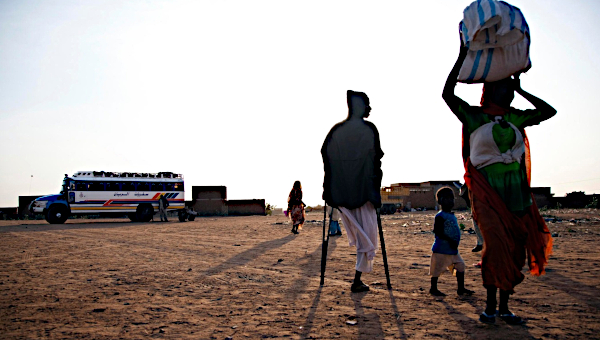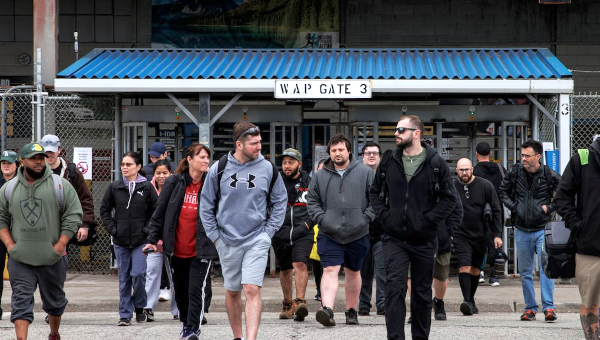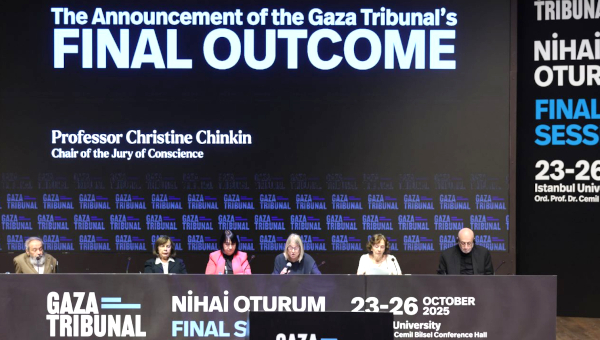Canada’s History of Promoting Anti-Russian Ukrainian Nationalism
Russia’s full-scale invasion of Ukraine is a flagrant violation of international law. It has led to thousands of deaths, millions of refugees, and tens of billions of dollars in damage. Troublingly, the situation could get worse if the escalatory political response sweeping Canada is any indication.
A month ago, Ottawa was unwilling to send lethal weapons to the Ukrainian military, yet now Foreign Affairs Minister Mélanie Jolie is proclaiming that “we must ensure that there are more weapons in Ukraine.” Since February 27, Canada has announced three new weapons donations, which include 4,500 M72 rocket launchers, 7,500 hand grenades, 100 Carl-Gustaf M2 anti-tank weapons, and 2,000 rounds of ammunition.
The leader of the Conservative Party, former chief of defence staff, and much of the media are unsatisfied. Interim Conservative Leader Candice Bergen is calling for a no-fly zone, which would create, effectively, a direct conflict between NATO and Russia. A no-fly zone would require NATO forces to shoot down Russian planes and target its S-400 anti-aircraft missile system inside Russia, which would probably lead to further carnage in Ukraine and possibly even cataclysmic nuclear war.
Less warlike politicians and commentators have pointed out the danger of escalating the conflict. But they have limited ability to push back, as they generally fear discussing how Canada helped precipitate the invasion.
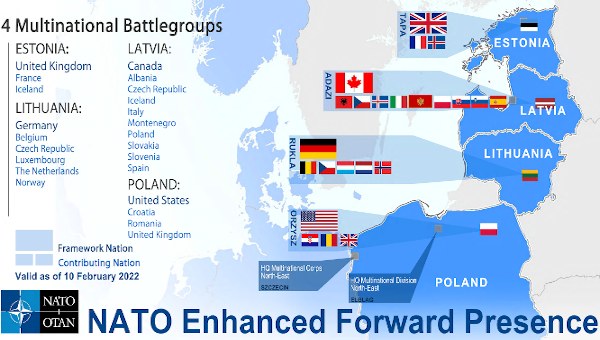
NATO, Russia, and Canada
Various dynamics explain Russia’s aggression. That country has a long imperial history, is highly militaristic, and has a right-wing nationalist leader. But Canada has also helped bring Russia’s worst tendencies to the fore by promoting NATO expansion and xenophobic nationalism in Ukraine.
In defiance of promises made to Soviet/Russian leader Mikhail Gorbachev regarding the reunification of Germany, Ottawa has promoted NATO expansion. In 1994, Prime Minister Jean Chrétien called on the Alliance to admit new members, complaining, as reported the Edmonton Journal, that Washington wasn’t moving “fast enough to incorporate Poland and some other countries into the 16-member NATO military alliance.”
In 1997, Poland, Hungary and the Czech Republic were granted a path to NATO membership. Ottawa pressed for Romania, Slovenia, and Slovakia to also be admitted, but Washington objected. Without so much as a debate in Parliament, Canada was the first NATO country to approve the enlargement of the Alliance in 1998.
In 1996, Chrétien expressed support for Ukraine’s acceptance into NATO, which was particularly menacing to Russia. With Ukraine joining the North Atlantic Cooperation Council and NATO’s Partnership for Peace in the early 1990s, Canada added the country to its Military Training and Cooperation Program (MTCP). Since then, Ukraine has been “the single largest recipient of training and funding under” MTCP, which is partly designed to strengthen foreign militaries’ capacity to operate in tandem with NATO forces.
In the lead-up to the April 2008 NATO summit, Prime Minister Stephen Harper expressed “strong support” for Ukraine to join NATO. “I call upon our NATO partners to agree that we should keep Ukraine moving forward toward full membership in the alliance,” declared Harper. But Germany and France opposed Ukraine joining NATO.
Ukraine
Since 2014 when the US and Canada backed the ouster of President Viktor Yanukovych, Canada has devoted significant resources to preparing the Ukrainian military to join NATO. Through Operation UNIFIER 200, Canadian trainers have worked to “modernize the Ukrainian Armed Forces,” noted former Defence Minister Harjit Sajjan, so the country could join the Alliance.
In the two decades after independence, polls showed that Ukrainians were opposed or ambivalent toward joining NATO. But two US/Canadian-backed regime-change efforts deepened Ukraine’s rapprochement with NATO.
In 2004, Western-backed civil society groups protested a presidential election in which Viktor Yanukovich officially garnered 49.4% of the second-round vote and Viktor Yushchenko 46.7%. Two weeks of protests against the results spurred the Supreme Court to call for a rerun of the vote. In the “US campaign behind the turmoil in Kiev,” The Guardian reported that the “Orange Revolution” was “an American creation, a sophisticated and brilliantly conceived exercise in western branding and mass marketing,” which included “US consultancies, pollsters, diplomats, the two big American parties and US non-government organisations.”
Canada assisted the opposition movement through its public declarations, funding, election monitors, and coordination of foreign diplomats. In “Agent Orange: Our secret role in Ukraine,” Globe and Mail’s Mark Mackinnon reported that beginning in January 2004 Canadian Ambassador Andrew Robinson
“began to organize secret monthly meetings of western ambassadors, presiding over what he called ‘donor coordination’ sessions among 20 countries interested in seeing Mr. Yushchenko succeed. Eventually, he acted as the group’s spokesman and became a prominent critic of the Kuchma government’s heavy handed media control. Canada also invested in a controversial exit poll, carried out on election day by Ukraine’s Razumkov Centre and other groups that contradicted the official results showing Mr. Yanukovich [winning].”
A staunch advocate of NATO, Yushchenko became president. However, Yanukovich’s Party of Regions won the most votes in the 2006 parliamentary elections, delivering a blow to NATO expansionists. After Yanukovych won the 2010 presidential election, Ukraine’s parliament passed a measure rejecting that country’s adhesion to NATO, but that was overturned after he was ousted in 2014.
Ottawa actively assisted the ouster of President Yanukovych, who was oscillating between the European Union and Russia. The federal government and ultranationalist Ukrainian Canadian Congress (UCC) poured funds into Western-oriented civil society groups and encouraged the Maidan protests by demonizing President Viktor Yanukovych throughout his time in office.
Months after Yanukovych became president, Canada’s prime minister declared, “There are issues that are of concern to Ukrainian-Canadians and to the government of Canada involving issues of human rights and the rule of law, and I’ll be raising those with President Yanukovych.” In an October 2011 letter threatening to sever Canada’s “special” relationship with Ukraine, Harper wrote, “I cannot overstate the potential negative impact of the current judicial proceedings against Yulia Tymoshenko on both Ukraine’s future relations with Canada and others.”
Maidan Square
Canada assisted pro-European Union, often far-right, protesters that rallied in central Kyiv’s Maidan Square from November 21, 2013, to February 22, 2014. Ottawa also quickly recognized the post-coup government despite having sent election observers to monitor the 2010 presidential election, which the Organization for Security and Co-operation in Europe called “an impressive display of democracy.”
As revealed in a leaked tape of a conversation between Assistant Secretary of State Victoria Nuland and US Ambassador to Ukraine Geoffrey Pyatt, US officials midwifed Yanukovych’s unconstitutional replacement. “It really was the most blatant coup in history,” explained George Friedman, CEO of the CIA-aligned Stratfor, in describing Yanukovych’s ouster.
A little over a week into the EuroMaidan protests, Canada released a statement critical of government repression, which University of Ottawa professor Ivan Katchanovski says was precipitated by far-right infiltrators. In a November 30, 2013, release entitled “Canada Condemns Use of Force Against Protesters in Ukraine,” Foreign Affairs Minister John Baird declared, “Canada strongly condemns the deplorable use of force today by Ukrainian authorities against peaceful protesters.” Six days later, Baird visited Maidan Square with Paul Grod, president of the ultranationalist Ukrainian Canadian Congress. From the stage, Grod announced Baird’s presence and his support for the protesters, which led many to chant, “Thank you, Canada.” Baird called on Ukrainian authorities to respect the protests and bemoaned “the shadow that Russia is casting over this country.”
Throughout the protests against Yanukovych, the Canadian embassy’s local spokesperson, Inna Tsarkova, was a prominent member of AutoMaidan, an anti-government group. At the height of the protest, activists used the Canadian embassy, which was immediately adjacent to Maidan Square, as a safe haven for “at least a week.” In a story revealing protesters’ use of the Canadian Embassy, the Canadian Press quoted officials from allied European nations accusing Canada of being “an active participant in regime change.”
At least some of those allowed to use the Canadian embassy were from the far right. In “The far right, the Euromaidan, and the Maidan massacre in Ukraine,” Professor Katchanovski reported that “the leader of the [far right] Svoboda-affiliated C14 admitted that his C14-based Maidan Self-Defense company took refuge in the Canadian embassy in Kyiv on February 18 and stayed there during the Maidan massacre.”
On February 19 and 20, more than fifty people were killed in violence that was widely blamed on government security forces. But Katchanovski shows that far-right activists were, in fact, responsible for many of these deaths. These killings precipitated the collapse of the government. After Yanukovych was ousted, Ottawa sought to shore up the unconstitutional government. Soon after, Baird “welcomed the appointment of a new government,” saying, “the appointment of a legitimate government is a vital step forward in restoring democracy and normalcy to Ukraine.” But the country’s constitutional provisions dealing with impeachment or replacing a president were flagrantly violated.
The coup divided the Ukraine politically, geographically, and linguistically (Russian is the mother tongue of 30% of Ukrainians and as much as 75% of those in eastern cities). The Russian-oriented East and South protested the ouster of Yanukovych. Many opposed the post-coup right-wing nationalist government, which immediately eliminated Russian as an official language. The coup led to an eight-year war in the eastern Donbas region that left some 14,000 dead.
The Orange Revolution set the stage for the conflict unleashed after Yanukovych was ousted in 2014. The events of 2004 heightened regional tensions, engendering significant bitterness in Crimea and Donbas, Yanukovych’s power base.
Large sums from North America assisted the Orange Revolution and Maidan Uprising. In 2013, Victoria Nuland boasted that the National Endowment for Democracy (NED), USAID, and other US government agencies had plowed $5-billion into bolstering Western-oriented forces in Ukraine since 1991. Canada also channeled tens, probably hundreds, of millions of dollars to anti-Russian nationalist elements of Ukrainian civil society. The lead group in organizing the Orange Revolution, Pora, received US$30,000 from the Canadian embassy, which was its first donation.
Canadian Government Involvement
Canadian support for nationalist, anti-socialist forces in the Ukraine has a long history. In 1952, External Affairs launched a Ukrainian section of Radio Canada International (RCI) to disseminate the Canadian government’s perspective there. The previous year, External Affairs Minister Lester Pearson told Parliament that RCI was “playing a useful part in the psychological war against communism.” RCI bolstered the anti-Soviet nationalist elements among the émigré community.
The Canadian government also supported ultra-nationalist Ukrainian émigrés more directly. In 1940, McKenzie King’s Liberal government facilitated the creation of the Ukrainian Canadian Congress (UCC) to undercut more socialist and internationalist elements within the community. In “The Ukrainian Canadian Congress and its Fascist Roots,” Richard Sanders writes, “Their explicit goal in orchestrating the creation of this umbrella organisation was to rally all anti-communist Ukrainians into one body in order to squash the then-powerful influence of left-wing Ukrainians whose forebears had come to Canada during earlier waves of migration.” After World War II, the UCC benefited from Canada opening its door to tens of thousands of Ukrainians nationalists, many of whom had fought with the Nazis against the Soviets.
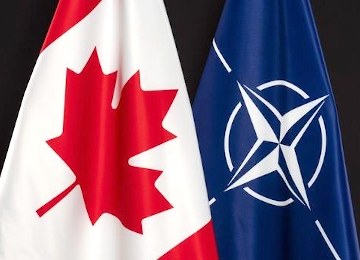
Over the years, Ottawa has provided various forms of financial and other support to the UCC. In so doing, they’ve helped the organization maintain its hegemony over Ukrainian Canadian politics and its sizable international influence. For the last thirteen years, Canadians have led the Ukrainian World Congress (UWC), which was set up in 1967, as an anti-Soviet organization.
The UWC, UCC, and Canada’s large diaspora community more generally is influential in the Ukraine, which has by far the lowest per-capita GDP in Europe. Ukrainian-Canadians have a largely Western-oriented vision for Ukraine’s future.
Deputy Prime Minister Chrystia Freeland provides a stark example of the influence of nationalist, anti-socialist, and anti-Russian Ukrainian Canadians. During a 1989 visit, as reported in the Globe and Mail, Freeland “delivered cash, video-and audio-recording equipment, and even a personal computer to her contacts in Ukraine.” Freeland’s support for anti-Soviet Ukrainian nationalists got her followed by the KGB and labeled by the Russian press as an “anti-Soviet bourgeois nationalist.” Freeland represented the UCC and Canadian Institute of Ukrainian Studies at a 1989 congress of the Ukrainian People’s Front. After the breakup of the Soviet Union Freeland supported Ukraine maintaining its nuclear weapons arsenal. Her mother also helped draft the Ukraine’s inaugural constitution.
In his 1994 book Blood and Belonging: Journeys into the New Nationalism, Michael Ignatieff describes conversations with Freeland, who was then working in Ukraine for the Financial Times. He writes,
“One of thousands of those second-generation Ukrainian Canadians who were raised to dream about an independent Ukraine by their exiled parents and now have come back to live and work in the reality of independence. It is common, she says, for Canadian Ukrainians to think of themselves as the true Ukrainians, the ones who kept the faith while among the actual Ukrainians the compulsion and fatalism of the Communist system was working its way into their bones. The Ukrainian Canadians return ‘home’ expecting a fervently nationalist and religious people, and find instead phlegmatic, ironic, sober, and fatalistic Soviet souls. Independence requires a new human type, but she says, with an equal measure of affection and irritation, it will be a long time coming.”
Freeland’s family are hardline nationalists. Her grandfather, Michael Chomiak, was a Nazi propagandist during World War II. Chomiak edited a Ukrainian language newspaper that published speeches by Hitler and Goebbels, as well as the Nazi’s anti-Jewish/Soviet screeds. Fleeing the Ukraine after the Soviets defeated the Nazis, Chomiak was influential in Alberta’s Ukrainian community through the 1980s. Freeland has repeatedly praised him. Two weeks ago, the Deputy Prime Minister posted a photograph to Twitter (later removed) of her standing behind a black-and-red scarf identified with the far-right at a Ukrainian solidarity march in Toronto.
As Freeland highlights, Canada has nurtured ultra-nationalist forces who vehemently oppose relations between Ukraine and Russia. The Canadian military also directly assisted the Ukrainian far right. In June 2018, Canada’s military attaché in Kiev, Colonel Brian Irwin, met privately with officers from the Azov battalion, which uses the Nazi “Wolfsangel” symbol and praises officials who helped slaughter Jews and Poles during World War II. Rather than express public disagreement with their views, Canadian military officials sought to manage any potential public relations fallout from at least two meetings, which included Azov representatives boasting about their Canadian support. A September report from an institute at George Washington University revealed that the far-right Centuria also boasted about being trained by some of the 200 Canadian troops in the Ukraine. The report detailed Centuria members making Nazi salutes, praising SS units, and promoting white supremacy.
Canadian training of the Ukrainian military, including the far right, assisted Kyiv in ignoring its obligations under the Minsk agreements designed to overcome the violence and division caused by the ouster of Yanukovych in 2014. Negotiated by France, Germany, Russia, and Ukraine, Minsk I and II proposed a more federalist Ukrainian politics to end the war in the Donbas region. Ostensibly, the Canadian government supported Minsk II, which was unanimously endorsed by the United Nations Security Council. But in practice, Ottawa helped build up a Ukrainian security apparatus that blocked its implementation.
Canada’s refusal to push for a diplomatic solution to the war in eastern Ukraine increased the likelihood of escalating the conflict. One of the pretexts/rationales Vladimir Putin gave for invading was to end violence in the Donbass, which was largely being caused by the Ukrainian military.
With Moscow demanding a guarantee that Ukraine wouldn’t be incorporated into NATO, in mid-January Canada’s foreign affairs minister doubled down. Mélanie Joly reiterated that “Canada’s position has not changed… We believe that Ukraine should be able to join NATO.”
Russia’s invasion must be condemned as a flagrant violation of international law. But to halt the escalatory dynamics sweeping Canadian politics, we need to discuss how Canada helped precipitate the conflict. •



